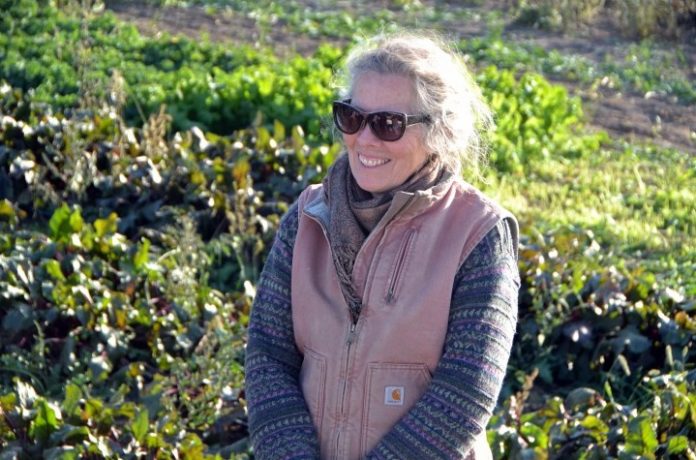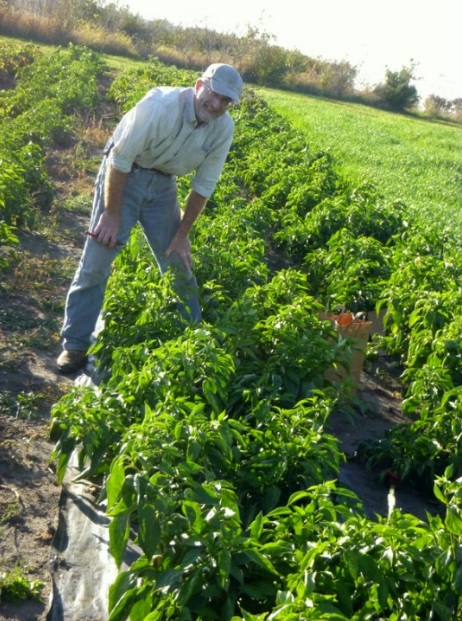
AMES — For backyard and hobby gardeners, the colorful photos and eloquent descriptions found in today’s seed catalogs can be an enticing means of choosing what to plant. But for many commercial fruit and vegetable producers, those details are insufficient for making major decisions about which varieties to grow for their businesses.
These descriptions are often not specific to Iowa, and they rarely account for a farm’s unique growing conditions or management practices.
To address this information gap, five Iowa fruit and vegetable growers conducted on-farm research in 2015, comparing the performance of two bell pepper varieties on their farms. The farmers are expanding their research this summer to assess summer broccoli, determinate tomatoes grown in high tunnels and annual flowering herbs for pollinator health.
This research, conducted in partnership with Practical Farmers of Iowa (PFI), is yielding valuable data on how different varieties perform in Iowa growing conditions, soil types and management systems. The results are arming Iowa fruit and vegetable growers with data they need to make informed business decisions.
Participating farmers included Susan Jutz of ZJ Farms in Solon, Tim Landgraf of One Step at a Time Gardens in Kanawha, Alice McGary of Mustard Seed Community Farm in Ames and Mark Quee of Scattergood Farm at the Scattergood Friends School in West Branch and Rick Hartmann of Small Potatoes Farm in Minburn.
“Field trials have been hugely advantageous to my farm operation,” said Jutz, who has been conducting on-farm research on her own and with Practical Farmers for more than 20 years. “I can make data-based decisions rather than anecdotal decisions. I can read all the information I want from Johnny’s or other seed catalogs, but how does it work in my system? The only way to answer that question is to run a trial on our farm.”
The two bell pepper varieties studied in 2015 – Olympus and Revolution – were chosen by the small-scale growers because of positive farmer experience, the similarities between the two and the availability of organic and untreated seed. Participants planted four replications of each pepper variety in randomized pairs of research plots.
Specific management details – such as plant spacing, mulching, irrigation, harvest frequency, and disease and pest management practices – were decided by the individual farmers.
While this set-up meant average end-of-season yields differed by farm – as expected – certain distinct trends emerged. Three farms found that Revolution produced heavier and more peppers, while two farms found no difference in yield. When all farms were analyzed together, Revolution yielded significantly more than Olympus: an average of 4.3 pounds per plant for Revolution to 4.03 pounds per plant for Olympus.
The full research report, “Bell Pepper Variety Trial – Olympus and Revolution,” is available online.
ZJ Farms was one of the farms that found no yield difference between Revolution and Olympus. Jutz said both under-performed compared to Ace, her preferred pepper variety. She attributes the under-performance to her specific management practices.
“If we used Revolution or Olympus, we would have to adjust our system,” Jutz said. “They didn’t perform in our system the way Ace does. If we wanted to go to a big green bell pepper, such as Revolution or Olympus, we now know how to do that.”
Encouraged by the utility of the bell pepper variety trial’s farm-specific data, the same farmers are expanding their focus to examine other crop varieties. This summer, the original group and some additional farms will conduct on-farm research with broccoli.
They hope to find out which broccoli variety performs best as a summer broccoli in Iowa (harvested primarily in July and August), which determinate tomato variety performs best in high tunnels, and which of three annual flowering herbs is most attractive to pollinators.

Landgraf and Jan Libbey of One Step at a Time Gardens are participating in this new research and will host a free Practical Farmers field day Aug. 14 to share preliminary results and highlight the process and importance of their on-farm research.
“We participate with PFI because we gain even more insights working through the experience together with other farmers,” Landgraf said. “Also, by having data from other producers across Iowa, we get a glimpse of how robust the conclusions are.”
Funding for the bell pepper variety research was provided by Ceres Trust. The three forthcoming variety trials are also funded by Ceres Trust as well as the Iowa Department of Agriculture and Land Stewardship.
PFI’s Cooperators’ Program helps farmers use accepted scientific methods to transition to more sustainable and economically profitable systems through research, record-keeping and demonstration projects. The Cooperators’ Program began in 1987 with farmers looking to save money through more judicious use of inputs and now includes research on a wide range of field crop, livestock, horticulture, on-farm energy and cover-crop questions.
















